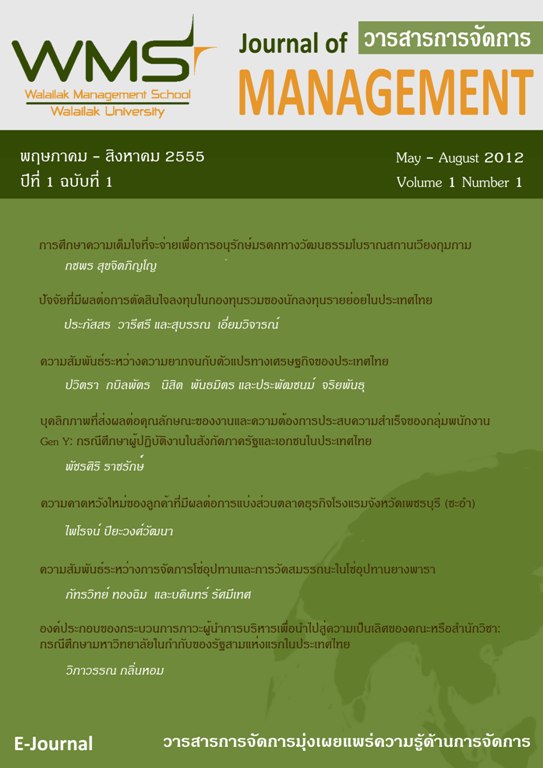Relationship of Supply Chain Management and Performance Measurement in Rubber Supply Chains
Main Article Content
Abstract
The purpose of this research is a guideline to improve the supply chain management in Thailand’s rubber supply chain. The study uses structural equation modeling for analysis the relationships between supply chain management practices 3 dimensions (Supply chain management Planning, Supplier Partnership, Customer Relationship) and supply chain management performance. The SCM performances have defined in 2 dimensions: Competitive advantage (cost, quality, time) and Firm performance. Data for this study were collected form 493 first-line and middle manager in manufactory such as tire manufactory, bock rubber manufactory, which is member of rubber supply chain.
The result show positive relations between SCM practices, competitive advantage and firm performance. The SCM practices have direct impact on competitive advantage, both direct and indirect impact on firm performance. So, Organization who has higher level of SCM practices can lead to high competitive advantage and enhanced firm performance.Article Details
References
กริช แรงสูงเนิน. 2554. การวิเคราะห์ปัจจัยด้วย SPSS และ AMOS เพื่อการวิจัย. กรุงเทพ.: ซีเอ็ดยูเคชั่น จำกัด.
กัลยา วานิชย์บัญชา. 2554. การใช้ SPSS for Windows ในการวิเคราะห์ข้อมูล. พิมพ์ครั้งที่ 19. กรุงเทพ.: ธรรมสาร.
Chen ,J. and Paulraj, A. 2004.” Towards a theory of supply chain management: the constructs and measurement.” Journal of Operations Management 22: 119–150.
Chin, S.Ou. et al. 2010. “A strutural model of supply chain management on firm performance.” International Journal of Operations & Production Management 30 (5): 526-545.
Chow, WS. et al. 2008 “Supply chain management in the US and Taiwan: An empirical study.” Omega 36: 665-679.
Cook, S. et al. 2011. “The moderating effect of supply chain role on the relationship between supply chain practices and performance An empirical analysis.” International Journal of Physical Distribution & Logistics Management 42 (2): 104-134.
Cooper, M.C. and Ellram, L.M. 1993. “Characteristics of supply chain management and the implication for purchasing and logistics strategy.” The International Journal of Logistics Management 4 (2): 13-24.
Cooper, M.C.et al. 1997. “Supply chain management: more than a new name for logistics. International.“ Journal of Logistics Management 8 (1): 1–13.
De Toni, A. and Tonchia, S. 2001. “Performance measurement systems - models, characteristics, and measures.” International Journal of Operations & Production Management 21 (1/2): 46-70.
Donlon, JP. 1996. “Maximizing value in the supply chain.” Chief Executive 117:54–63.
Feldmann, M. and Muller, S. 2003. “An incentive scheme for true information providing in supply chains.” Omega 31(2): 63-73.
Fisher, M.L. 1997. “What is the right supply chain for your product?” Harvard Business Review 75(2): 105-116.
Gunasekaran, A. et al. 2001. “Performance measures and metrics in a supply chain environment.” International Journal of Operations & Production Management 21 (1-2): 71-87.
Gunasekaran, A. et al. 2004. “A framework for supply chain performance measurement.” International Journal of Production Economics 87 (3): 333-347.
Jabbour,A. et al. 2011. “Measuring supply chain management practices.” Measuring Business Excellence 15 (2): 18-31
Kline, R.B. 2005. Principles and Practice of Structural Equation Modeling. New York, The Guilfod Press.
Koh, S.C. et al. 2007. “The impact of supply chain
management practices on performance of SMEs.” Industrial Management & Data Systems 107 (1): 103-124
Li, S. et al. 2006. ”The impact of supply chain management practices on competitive advantage and organizational performance” Omega 34: 107-124.
Min, S. and Mentzer, J.T. 2004. “Developing and measuring supply chain management concepts.” Journal of Business Logistic 25 (1) 63-99.
Sahay, B.S. and Mohan, R. 2003. “Supply chain management practices in Indian industry.” International Journal of Physical Distribution & Logistics Management 33 (7): 582-606
Sauber,A. et al 2008. “Developing supply chain
management program: a competency model.” Quality Assurance in Education 16 (4): 375-391.
Tan, K.C.et al. 2002 “Supply chain management: a strategic perspective.” International Journal of Operations & Production Management 22 (6): 614-31.
Ulusoy Gunduz 2003. “An assessment of supply chain and innovation management practices in the manufacturing industries in Turkey.” International Journal of Production Economics 86: 251-270.


